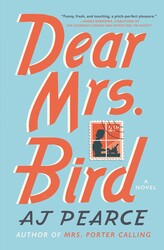Table of Contents
About The Book
From the author of the “jaunty, heartbreaking winner” (People) and international bestseller Dear Mrs. Bird comes a charming and uplifting novel set in London during World War II about a plucky young journalist and her adventures as wartime advice columnist.
London, November 1941. Following the departure of the formidable Henrietta Bird from Woman’s Friend magazine, things are looking up for Emmeline Lake as she takes on the new challenges as a wartime advice columnist. Her relationship with boyfriend Charles is blossoming, while Emmy’s best friend Bunty, still reeling from the very worst of the Blitz, is bravely looking to the future. Together, the friends are determined to Make a Go of It.
When the Ministry of Information calls on Britain’s women’s magazines to help recruit female workers to the war effort, Emmy is thrilled to step up and help. But when she and Bunty meet a young mother who shows them the very real challenges that women war workers face, Emmy must confront a dilemma between doing her duty and standing by her friends.
As funny, heartwarming, and touching as Dear Mrs. Bird, Yours Cheerfully is an endearing portrait of female friendship and “a fruitful exploration of the solidarity among women in times of grief, love, and hardship” (Publishers Weekly).
London, November 1941. Following the departure of the formidable Henrietta Bird from Woman’s Friend magazine, things are looking up for Emmeline Lake as she takes on the new challenges as a wartime advice columnist. Her relationship with boyfriend Charles is blossoming, while Emmy’s best friend Bunty, still reeling from the very worst of the Blitz, is bravely looking to the future. Together, the friends are determined to Make a Go of It.
When the Ministry of Information calls on Britain’s women’s magazines to help recruit female workers to the war effort, Emmy is thrilled to step up and help. But when she and Bunty meet a young mother who shows them the very real challenges that women war workers face, Emmy must confront a dilemma between doing her duty and standing by her friends.
As funny, heartwarming, and touching as Dear Mrs. Bird, Yours Cheerfully is an endearing portrait of female friendship and “a fruitful exploration of the solidarity among women in times of grief, love, and hardship” (Publishers Weekly).
Reading Group Guide
This reading group guide for Yours Cheerfully includes an introduction, discussion questions, and ideas for enhancing your book club. The suggested questions are intended to help your reading group find new and interesting angles and topics for your discussion. We hope that these ideas will enrich your conversation and increase your enjoyment of the book.
Introduction
London, September 1941. Things are looking up for Emmy Lake as she takes on the challenge of becoming a young wartime advice columnist. Her relationship with her boyfriend, Charles, is blossoming, while her best friend Bunty, still reeling from a terrible loss in the Blitz, is trying to move forward. Together, the friends are determined to Make a Go of It.
The Ministry of Information calls on Britain’s women’s magazines to help recruit women workers to the war effort and Emmy is thrilled to be asked to step up. But when she and Bunty meet a young mother who shows them the very real challenges that women war workers face, Emmy is caught between fulfilling her professional duties and standing by her friends.
Yours Cheerfully is a testament to the strength of women and the importance of lifting each other up, even in the most challenging times.
Topics & Questions for Discussion
1. In 1941, Britain had been at war for two years and London had just survived the Blitz—a brutal series of German air raids that dropped more than 12,000 metric tons of bombs from September 1940 to May 1941, killing nearly 30,000 civilians. What do you imagine Londoners were feeling and thinking at this time?
2. Mrs. Mahoney tells Emmy that “caring about getting things right is worth its weight in gold” (16). How do the staff members at Woman’s Friend express that they care about getting things right?
3. When Emmy attends the first meeting at the Ministry of Information, she can’t wait to get started on the campaign to encourage women war workers. Why does Emmy feel this call to arms so keenly?
4. Mrs. Edwards of Woman Today is a memorable figure and a role model for Emmy. Why does she make such an impression on Emmy?
5. Bunty says, “There are women who stick up for each other, and women who don’t. You’re either one or the other. It’s as simple as that” (44). Compare those who stick up for others to those who don’t in Yours Cheerfully. What are their respective motivations? Is it always “as simple as that”?
6. Meeting Anne gives Emmy a new perspective on women war workers, particularly factory workers. Why do you think Emmy was surprised by the experiences, challenges, and circumstances of the women working at Chandlers?
7. Compare Mr. Terry and Mr. Rice. Are they equally at fault in the issues facing the women at Chandlers?
8. Why is childcare such a contentious issue? What dynamics are at play? Why is there an “interminable” loop from factory management to local authorities to the Ministry of Health and to the Ministry of Labour?
9. Discuss the competing demands Emmy faces in her work, such as the Ministry recruitment campaign versus the women workers’ welfare. In what ways does Emmy try to strike a balance? Does she succeed?
10. Was Emmy right to suggest the parade to Anne and her friends at Chandlers? What might you try to do for the women if you were Emmy?
11. Mr. Collins and Charles, though half-brothers, present two very different male experiences during World War II. What characteristics do they bring from their respective generations? How do they experience this war differently?
12. Emmy reflects that in the letters to Yours Cheerfully the readers often “referred to something a friend of theirs had said. They weren’t always complimentary, but invariably you knew that their friends were a central part of their world, especially with so many men now away” (220). How does the war affect women’s everyday lives? Why are friendships so vital?
Enhance Your Book Club
1. Read more about nurseries and the role they played in World War II in Britain via the East End Women’s Museum at https://eastendwomensmuseum.org/blog/2018/8/7/women-babies-and-bombs-how-day-nurseries-contributed-to-working-womens-lives-during-wwii.
2. Watch War Comes to London, City Bound, or London 1942, available from the British Council Film Archive at https://film.britishcouncil.org/resources/film-archive/war-comes-to-london, https://film.britishcouncil.org/resources/film-archive/city-bound, and https://film.britishcouncil.org/resources/film-archive/london-1942. What does the narration in these short films try to convey to the viewer? What does it imply about British culture and values at the time?
3. If you haven’t read it yet, discover Dear Mrs. Bird, the first novel in the Emmy Lake Chronicles.
Introduction
London, September 1941. Things are looking up for Emmy Lake as she takes on the challenge of becoming a young wartime advice columnist. Her relationship with her boyfriend, Charles, is blossoming, while her best friend Bunty, still reeling from a terrible loss in the Blitz, is trying to move forward. Together, the friends are determined to Make a Go of It.
The Ministry of Information calls on Britain’s women’s magazines to help recruit women workers to the war effort and Emmy is thrilled to be asked to step up. But when she and Bunty meet a young mother who shows them the very real challenges that women war workers face, Emmy is caught between fulfilling her professional duties and standing by her friends.
Yours Cheerfully is a testament to the strength of women and the importance of lifting each other up, even in the most challenging times.
Topics & Questions for Discussion
1. In 1941, Britain had been at war for two years and London had just survived the Blitz—a brutal series of German air raids that dropped more than 12,000 metric tons of bombs from September 1940 to May 1941, killing nearly 30,000 civilians. What do you imagine Londoners were feeling and thinking at this time?
2. Mrs. Mahoney tells Emmy that “caring about getting things right is worth its weight in gold” (16). How do the staff members at Woman’s Friend express that they care about getting things right?
3. When Emmy attends the first meeting at the Ministry of Information, she can’t wait to get started on the campaign to encourage women war workers. Why does Emmy feel this call to arms so keenly?
4. Mrs. Edwards of Woman Today is a memorable figure and a role model for Emmy. Why does she make such an impression on Emmy?
5. Bunty says, “There are women who stick up for each other, and women who don’t. You’re either one or the other. It’s as simple as that” (44). Compare those who stick up for others to those who don’t in Yours Cheerfully. What are their respective motivations? Is it always “as simple as that”?
6. Meeting Anne gives Emmy a new perspective on women war workers, particularly factory workers. Why do you think Emmy was surprised by the experiences, challenges, and circumstances of the women working at Chandlers?
7. Compare Mr. Terry and Mr. Rice. Are they equally at fault in the issues facing the women at Chandlers?
8. Why is childcare such a contentious issue? What dynamics are at play? Why is there an “interminable” loop from factory management to local authorities to the Ministry of Health and to the Ministry of Labour?
9. Discuss the competing demands Emmy faces in her work, such as the Ministry recruitment campaign versus the women workers’ welfare. In what ways does Emmy try to strike a balance? Does she succeed?
10. Was Emmy right to suggest the parade to Anne and her friends at Chandlers? What might you try to do for the women if you were Emmy?
11. Mr. Collins and Charles, though half-brothers, present two very different male experiences during World War II. What characteristics do they bring from their respective generations? How do they experience this war differently?
12. Emmy reflects that in the letters to Yours Cheerfully the readers often “referred to something a friend of theirs had said. They weren’t always complimentary, but invariably you knew that their friends were a central part of their world, especially with so many men now away” (220). How does the war affect women’s everyday lives? Why are friendships so vital?
Enhance Your Book Club
1. Read more about nurseries and the role they played in World War II in Britain via the East End Women’s Museum at https://eastendwomensmuseum.org/blog/2018/8/7/women-babies-and-bombs-how-day-nurseries-contributed-to-working-womens-lives-during-wwii.
2. Watch War Comes to London, City Bound, or London 1942, available from the British Council Film Archive at https://film.britishcouncil.org/resources/film-archive/war-comes-to-london, https://film.britishcouncil.org/resources/film-archive/city-bound, and https://film.britishcouncil.org/resources/film-archive/london-1942. What does the narration in these short films try to convey to the viewer? What does it imply about British culture and values at the time?
3. If you haven’t read it yet, discover Dear Mrs. Bird, the first novel in the Emmy Lake Chronicles.
About The Reader
Anna Popplewell
Product Details
- Publisher: Simon & Schuster Audio (August 10, 2021)
- Runtime: 10 hours and 55 minutes
- ISBN13: 9781797124155
Raves and Reviews
"Popplewell does an excellent job representing the male and female staff of the women's magazine at the heart of the story. She brings across the polite nature of British society in this period, as well as the burgeoning power of women like Emmy who were working outside the home. Popplewell creates an engaging tapestry that listeners will appreciate."
– AudioFile Magazine
Resources and Downloads
High Resolution Images
- Book Cover Image (jpg): Yours Cheerfully Unabridged Audio Download 9781797124155
- Author Photo (jpg): AJ Pearce Credit: Jenny Smith(0.1 MB)
Any use of an author photo must include its respective photo credit







